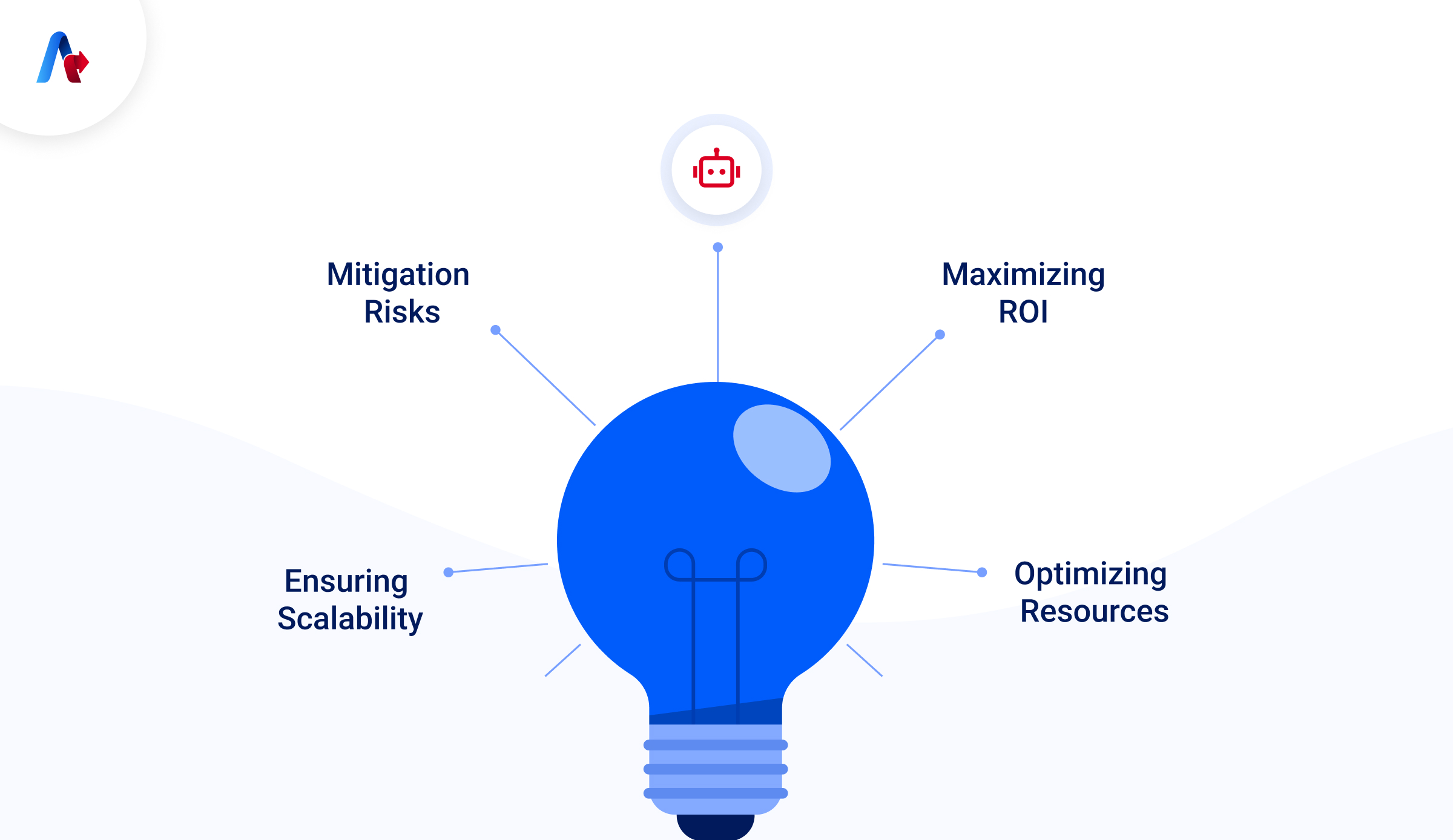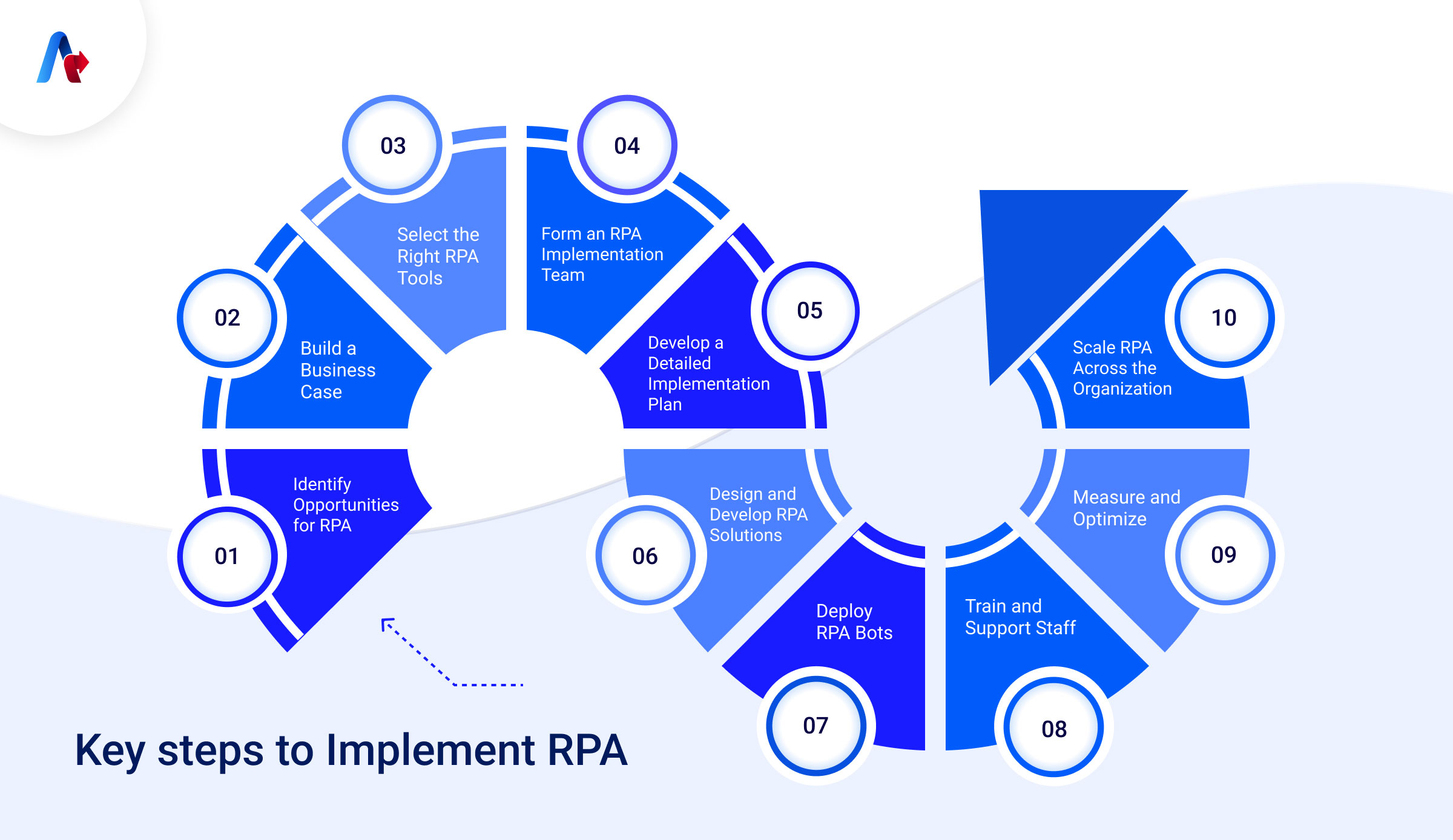RPA Implementation
BLOG
14 min read
How to Successfully Implement RPA in 2025: A Step-by-Step Guide
"Imagine having a digital workforce that never sleeps, never makes mistakes and accelerates your business operations around the clock." This is the power of Robotic Process Automation at work. Being one of the fastest-growing Technologies, RPA has transformed industries by automating repetitive, manual activities with precision and speed. From basic tasks like data entry to complicated invoice processing, RPA bots have enabled businesses to accomplish higher productivity, minimize errors and be faster than around times.
However, here's the catch— robotic process automation implementation is not as simple as plugging in a new tool. A proper RPA roadmap ensures businesses do not face issues like poor system integration, employee resistance and process bottlenecks. The significance of a structured approach is critical in this scenario.
Identifying prominent automation opportunities, selecting the right tools, and ensuring smooth adoption are critical to driving a successful RPA journey.
In this step-by-step guide, we will explore the essential phases of RPA implementation. From planning and developing to scaling RPA processes across different departments, every stage has a vital role to play in unlocking its true potential. The presence of the right strategy enhances businesses' chances of maximizing ROI, reducing operational expenses and gaining a competitive edge in the rapidly evolving business landscape of 2025.
Overview of RPA
Robotic process automation (RPA) is a revolutionary technology that automates repetitive, rule-based tasks, allowing enterprises to accomplish greater efficiency, accuracy and cost savings. An RPA bot is like an invisible assistant that handles process activities accurately and precisely. From crunching numbers to sorting emails, it frees human employees for more strategic roles.
This "Silent Revolution" has gained momentum due to widespread RPA implementation with the Global RPM market expected to be worth $30.85 billion by 2030, as reported by Grand View Research. RPA is more like an orchestra of unseen performers, enabling every task to sync in perfect harmony, driving efficiency and setting the stage for smarter and faster business operations.
Importance in Modern Business
Here are the features that strengthen your system and make your organization fit for the fierce competition in 2025 with RPA implementation:
- Automation of repetitive tasks: It automates mundane, stressful activities like data entry, transaction processing, and application filling, allowing human staff to focus more on strategic activities.
- User-friendly interface: Most RPA tools have a simple drag-and-drop interface, making them accessible even to non-technical users. This makes automation easy without the requirement of a deep programming language.
- Rule-based Automation: It is excellent in activities with a clear structure and predefined rules. These bots can execute tasks precisely and consistently, eliminating errors prone to manual intervention.
- Scalability: RPA solutions can be shared across different departments and systems, enabling both small-scale processes and enterprise-level automation with minimum disruption.
- Integration with existing systems: RPA is different from other automation tools in that it can be easily integrated with existing software systems, enabling streamlined automation across platforms without any costly system overhauls.
Ready to maximize ROI with RPA?
Contact UsPurpose of the Guide
This guide will comprehensively demonstrate Robotic Process Automation implementation and its significance in modern business operations. It will detail the strategies required for RPA implementation effectively and provide in-depth knowledge of different aspects related to successful RPA implementation.
Its structured approach facilitates knowledge about the seamless integration of RPA into existing business processes, enhancing operational efficiency and driving process automation. This guide is a valuable resource for enterprises seeking to capitalize on digital transformation while securing a competitive edge in this rapidly evolving market.
Importance of a Structured Approach to RPA Implementation

- Maximizing ROI: A structured approach helps align initiatives with organizational goals. It improves RPA process flow, optimising resource allocation and delivers better returns on investment.
- Mitigation Risks: A clear road map and a well-defined plan make identifying potential risks easier and allow timely risk mitigation strategies.
- Ensuring Scalability: A structured plan enables seamless implementation of RPA solutions as the business expands to adapt to future demands.
- Optimising Resources: A structured approach enables businesses to maximize the efficient use of time, human resources and budget. This is required to drive cost-effective and successful implementation of RPA technologies.
The Process of RPA Implementation: Key Steps to Follow

Robotic Process Automation (RPA) is revolutionizing how businesses operate by automating repetitive and mundane tasks, allowing employees to focus on higher-value activities. Successful RPA implementation requires a structured approach to ensure the desired outcomes. Here is a step-by-step guide to effectively implement RPA.
Step 1: Identify Opportunities for RPA
1. Assess Current Processes: To begin, conduct a detailed analysis of your organization's existing workflows. The goal is to identify tasks that are repetitive, rule-based, and time-consuming. These are often tasks that require minimal decision-making and are prone to human error.
Examples:
- Data Entry: Manually entering customer information from emails into a CRM system.
- Invoice Processing: Matching purchase orders with invoices and entering data into an accounting system.
- Employee Onboarding: Filling out and processing forms for new hires, such as tax documents and benefits enrolment.
- Order Processing: Manually transferring order details from an e-commerce platform to an inventory management system.
2. Prioritize Processes:
Once you've identified potential tasks for automation, prioritize them based on criteria such as volume, frequency, and complexity. Processes with high transaction volumes or those that are performed frequently offer the greatest potential for efficiency gains. Additionally, focus on tasks where automation can reduce errors and speed up operations, leading to a higher return on investment (ROI).
Examples:
- High Volume: Manually entering customer information from emails into a CRM system.
- High Frequency: Matching purchase orders with invoices and entering data into an accounting system.
- Complexity: Manually transferring order details from an e-commerce platform to an inventory management system.
By carefully assessing and prioritizing processes, you can identify the best opportunities for RPA, ensuring that your automation efforts deliver maximum value.
Step 2: Build a Business Case
1. Define Objectives
The first step in building a business case for RPA is to clearly define the objectives of the implementation. These objectives should align with the overall business goals and provide a clear rationale for why RPA is necessary.
Examples of Objectives:
- Cost Reduction: Aim to reduce operational costs by automating manual, labor-intensive tasks. E.g. A company might target a 30% reduction in labour costs by automating data entry tasks in the finance department.
- Increased Efficiency: Focus on speeding up processes that are currently bottlenecks. E.g. Automating the customer onboarding process to reduce the time taken from 2 days to just a few hours.
- Improved Accuracy: Reduce errors in processes that are prone to human mistakes, leading to better data quality. E.g. Using RPA to automate invoice matching, reducing error rates from 5% to 0.5%.
2. Estimate Benefits and Costs
After defining the objectives, the next step is to estimate the potential benefits and weigh them against the costs of RPA implementation and maintenance. This involves calculating both tangible and intangible benefits and comparing them to the expenses involved in deploying and maintaining the RPA solution.
Examples:
- Time Savings: Calculate the amount of time saved by automating a process. E.g. If automating a process saves 20 hours of manual work per week, this can translate into significant productivity gains over a year.
- Error Reduction: Estimate the reduction in errors and the associated costs of correcting them. E.g. If a process currently has a 10% error rate and automation can reduce it to 1%, the savings on rework and error correction can be substantial.
- Increased Throughput: Measure the increase in output or the number of transactions processed. E.g. Automating order processing might allow the company to handle 50% more orders per day without increasing staff.
Step 3: Select the Right RPA Tools
1. Evaluate Vendors
To select the right RPA tool, begin by researching and evaluating various vendors based on key factors such as scalability, ease of use, integration capabilities, and support services. RPA implementation services should be focussed on the needs of your organization and how well each tool aligns with your objectives.
Examples:
- UiPath: UiPath is known for its user-friendly interface and strong support community. It's highly scalable, making it suitable for both small businesses and large enterprises. UiPath also offers robust integration capabilities, allowing seamless automation across different applications and systems.
- Automation Anywhere: Automation Anywhere provides a comprehensive suite of tools for end-to-end automation. It offers advanced features such as cognitive automation and AI integration, making it a good choice for organizations looking to automate complex processes. Additionally, its scalability and strong vendor support make it a reliable option for growing businesses.
2. Pilot Test
Before fully committing to an RPA tool, it's important to run pilot tests to evaluate how well it performs in your specific environment. This will help you assess its suitability and identify any potential challenges before a full-scale implementation.
Examples:
- Pilot with UiPath: A company might run a pilot test with UiPath to automate a simple data entry task. The pilot would help them assess UiPath’s ease of use, speed of deployment, and compatibility with existing systems.
- Pilot with Automation Anywhere: Another company might choose to pilot Automation Anywhere by automating a complex invoice processing task. The test would evaluate how well the tool handles the integration with their ERP system and whether it meets performance expectations in terms of accuracy and speed.
By evaluating vendors and conducting pilot tests, you can ensure that the selected RPA tool is the best fit for your organization's needs, providing confidence in the tool’s ability to deliver the desired results.
Step 4: Form an RPA Implementation Team
1. Assemble a Cross-Functional Team
Examples:
- IT Department: Include IT professionals to manage the technical aspects of the RPA implementation, such as system integration and security.
- Operations Team: Bring in members from operations to ensure that the automation aligns with daily workflows and improves process efficiency.
2. Assign Roles and Responsibilities
Examples:
- RPA Project Manager: Assign a project manager to oversee the entire implementation process, ensuring that the project stays on track and within budget.
- Business Analysts: Have business analysts work closely with stakeholders to identify automation opportunities and define process requirements.
- RPA Developers: Designate developers to build, test, and deploy RPA bots according to the defined requirements.
- Support Staff: Ensure that there are support staff available to manage the ongoing maintenance and troubleshooting of the RPA system.
Step 5: Develop a Detailed Implementation Plan
1. Create a Roadmap
Examples:
- Step-by-Step Plan: Create a roadmap that outlines each phase of the RPA implementation, such as initial process assessment, pilot testing, full deployment, and post-implementation review. Include timelines, milestones, and specific deliverables for each stage.
- Timelines: Set specific deadlines for each phase of the project, such as completing pilot testing within three months and full deployment within six months.
2. Risk Management
Examples:
- Identify Risks: Recognize potential risks such as resistance to change, data security concerns, or technical challenges during integration.
- Mitigation Strategies: Develop strategies to address these risks, such as conducting change management workshops to address resistance, implementing strict data security protocols, or planning for additional technical support during the integration phase.
By forming a well-rounded implementation team and developing a detailed plan, you can ensure a smooth and successful RPA deployment that meets your organization's objectives.
Step 6: Design and Develop RPA Solutions
- Process Mapping: Document the process thoroughly, including all steps, decision points, and exceptions. E.g. For invoice processing, map out steps like receiving the invoice, matching it with purchase orders, and handling discrepancies.
- Bot Development: Build RPA bots based on the documented workflows, ensuring they can handle exceptions and errors efficiently. E.g. Develop a bot to automate customer onboarding, including data entry, document verification, and sending welcome emails.
- Testing: Perform rigorous testing to ensure bots function correctly under various scenarios. E.g. Test the invoice processing bot with different types of invoices to ensure it can handle various formats and detect errors.
Step 7: Deploy RPA Bots
- Phased Deployment: Roll out bots gradually to minimize disruption and address any issues as they arise. E.g. Start by deploying the customer onboarding bot in one department before expanding it company-wide.
- Monitor Performance: Continuously track bot performance and gather user feedback to identify areas for improvement. E.g. Monitor the invoice processing bot to ensure it meets accuracy targets and adjust it based on user feedback.
Step 8: Train and Support Staff
- Training Programs: Provide comprehensive training to employees so they can effectively work with RPA bots. E.g. Conduct training sessions for finance staff on how to interact with the new invoice processing bot and troubleshoot common issues.
- Support Infrastructure: Set up a support system to assist users with issues and provide ongoing maintenance for the bots. E.g. Establish a helpdesk dedicated to resolving any technical issues that arise with the customer onboarding bot.
Step 9: Measure and Optimize
- Performance Metrics: Define key performance indicators (KPIs) to measure the impact of RPA on business processes. E.g. Track metrics like error reduction and processing speed for the invoice processing bot to assess its effectiveness.
- Continuous Improvement: Use data from performance metrics to refine and optimize RPA solutions. E.g. Analyse feedback and performance data from the customer onboarding bot to enhance its functionality and user experience.
Step 10: Scale RPA Across the Organization
- Expand Scope: Identify additional processes and departments that can benefit from RPA, and plan for scaling up the implementation. E.g. After successful deployment in finance, expand RPA to automate HR processes like payroll and benefits administration.
- Governance Framework: Establish a governance framework to manage RPA deployment across the organization. E.g. Create a central RPA team to ensure consistency and compliance across all automated processes within the company.
RPA Implementation Best Practises
- Define Clear Objectives: Particularise goals for the RPA initiative tailored to business needs.
- Start Small: Begin with a pilot project to test feasibility before scaling automation.
- Involve Stakeholders: Engage key stakeholders to create resonance and support throughout the process
- Monitor and Optimize: Continuously track performance and finetune processes for improved efficiency
Curious about how RPA can transform your business in 2025?
Get in Touch with UsSummary of Key Points
The guide has outlined 10 essential steps for successful RPA implementation, including defining objectives, selecting processes for automation, choosing the right RPA tool, setting up governance, and monitoring and optimizing the deployed bots. Each step is designed to ensure a smooth and efficient integration of RPA into your business operations.
Every step in the process is crucial for a successful RPA journey. From the initial planning to ongoing optimization, each phase contributes to maximizing the benefits of RPA, minimizing risks, and ensuring long-term success.
Final Thoughts
Why should we follow the guide for successful RPA implementation?
This guide breaks down every facet and details its importance, making organisations confident about the complexities of RPA implementation. Adhering to these steps will help them accomplish immediate goals and also leave a strong foundation for future automation initiatives, securing that position for sustainable growth and efficiency in business processes.
Potential Future Developments in RPA
With current investment in technology, RPA is going to evolve more. With the integration of artificial intelligence, cognitive automation order applicability across different industries is expected. We should stay informed and be responsive to using these advancements so that our businesses maintain a competitive edge in this age of automation.
Make RPA a reality for your business, take the next step in your automation journey.
Schedule a Consultation Today


